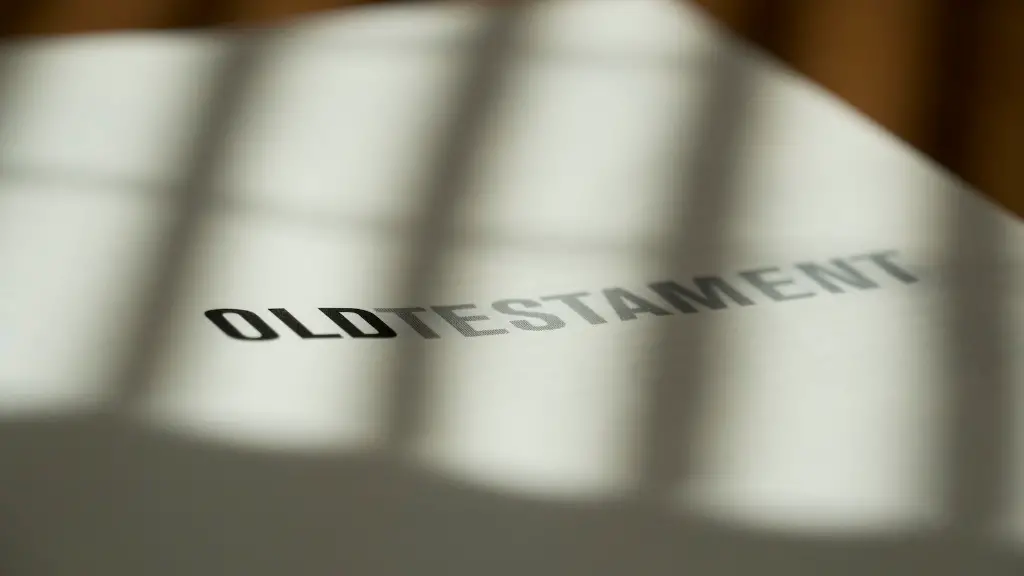The Bible has been revered by millions of people for centuries, and at the same time, it is seen as a source of controversy, debate, and diverging perspectives. The ongoing question is: Is the Bible perfect? In this article, we’ll explore some of the arguments and evidence presented by both sides of the debate and draw some extra insight into the Bible’s structure and implications.
The first proponent group comes from the realm of religious scriptures, including the Christian and Judaic faiths. Their argument is that the Bible is perfect and unchangeable, and its words are a direct indication from God. The second group consists of church officials, theologians, and theologians-historians — those who accept the notion of biblical inerrancy, but believe that it can be interpreted in different contexts and reinterpreted to fit contemporary needs.
The Bible is filled with stories, accounts, and other cultural materials — everything from the creation of the world to the Old Testament’s prophets and laws, to Jesus Christ’s teachings, to Revelation and the New Testament. This amalgamation of literature has sparked vehement debates around the world, given that many claim the stories to be inerrant.
The authenticity of some of the stories in the Bible has been called into question due to their similarities to those found in much older texts. For example, many elements from Moses’ exodus from Egypt were previously included in ancient Sumerian and Babylonian texts. Additionally, many of Jesus’ quotations and parables bear striking resemblance to those of other ancient Eastern teachers. This has led some to wonder if the Bible is a compilation of stories and inferences gathered from various sources, or an infallible document given by God himself.
Despite the wide array of interpretations, many still accept that the Bible is perfect and remains unchanged. This is especially true of evangelical Christians, who believe that individual interpretation should not be imposed on the Bible but instead that it should be read at face value. Such believers maintain that the Bible contains either absolutely true accounts of history or moral principles that should not be decontextualized.
On the other hand, not all followers of the Bible accept the notion that the book is perfect and unchangeable. Many scholars and theologians concede that the text of the Bible is fallible and does not always accurately reflect its original intent. This is especially true of parables and quotations that were originally intended to convey allegorical meanings. Furthermore, reinterpretations of the Bible — particularly as regards historical events — are common, and accepted by the mainstream religious culture.
An analysis of the number of inconsistencies, contradictions, and lapses in judgment found within the text of the Bible makes it seem quite difficult to believe that it is indeed perfect. For example, there are varying accounts of creation in the first two chapters of Genesis, and also of Jesus’ death in the Gospels, due to the discrepancies between the witnesses. Lastly, some of the laws in the Old Testament, such as stoning adulterers, do not reflect modern morality.
Expert Perspectives
Today, there is a range of views within the Christian faith on this issue. For example, Robert E.Koons, the Robert J. & Elizabeth Flanagan Chair in Philosophy at the University of Texas argues, “The Bible is not perfect, but it is divinely inspired.”[1] Similarly, New Testament scholar Bart Ehrman proposes that the Bible to be “a complex and multifaceted miracle, containing perfected truth, but imperfect in its actual physical form”.[2]
On the flip side, there are those, such as pastor and theologian John MacArthur who believe that the Bible is unquestionably perfect. MacArthur has compared the Bible’s origination to a modern day television show, suggesting that although the television show may be imperfect in itself, it remains the product of divine inspiration.[3]
Psychiatrist M. Scott Peck also viewed the Bible as an important source of spiritual knowledge but was critical of some aspects of the text: “The Bible is full of passages that I would call ‘theologically incorrect’—statements I believe are simply wrong, even dangerous”.[4]
Scientific Evidence
Science has been an important part of debates over the accuracy of the Bible. With the advent of DNA testing and the discovery of new archaeological evidence, the book’s acclaimed accuracy has been called into question. For example, the recent discovery of a skeleton near the city of Jericho, which predated the Biblical account of Jericho’s destruction by Joshua, is one of the most prominent examples of a contradiction between the Bible text and scientific evidence.
Additionally, it is noticeable that the Bible does not cover a wide range of scientific topics such as genetics, physics, or astronomy. This raises doubts about its inerrancy and thoroughness. However, an analysis of the Bible reveals that it functions to impart spiritual knowledge, rather than scientific facts. Despite this, it is important to note that the Bible contains a few references to scientific principles and was, in some cases, ahead of its time.
Relevance to Everyday Life
The debate over perfection of the Bible has a myriad of implications for everyday life. Those who are believers in the inerrancy and perfection of the Bible stress the importance of adhering to the book’s accounts and teachings. This contradicts, however, with those theologians who accept the Bible as fallible but valuable—they focus on the moral and spiritual messages within the text, while acknowledging their own individual, contextualized interpretations. Thus, it is up to the individual to decide which stance they take, as this will have an impactful influence on how they approach everyday life.
Furthermore, since modern society is largely secular and non-Biblical, the relevancy of the Bible is sometimes questioned. However, the Bible is an important source of religious and moral insights for many, and continues to be revered by millions as divinely inspired regardless of scientific or contextual evidence. This implies that the existence and applicability of the Bible remain, even in a changing world and growing secularism.
Analysis of Literalism
Literalism is a way of interpreting the Bible that suggests accepting it word-for-word, as if it were a legal document or a mathematical theorem. This stance has been rejected by most theologians due to its lack of interpretability and contextualization. Neither has it convinced many scientists, as it is in opposition to the scientific method, which relies on experiments and analysis to draw conclusions. Furthermore, this form of interpretation runs the risk of creating uncomfortable implications for modern morality and culture, as the Biblical laws are sometimes perceived as outdated and unsuitable in an ever-changing social landscape.
Ultimately, the debate over the Bible’s perfection is one that has been ongoing for centuries and is likely to continue. Although some may firmly believe in the literal interpretations of the Bible, there is no single consensus and a multitude of positions are taken by believers and non-believers alike.
Legal Implications
The legal implications of believing in the Bible’s perfection have grown more complex with recent technological advancements and the widening scope of religious freedom cases. For example, in Ontario, Canada, the supreme court recently discussed the significance of Biblical inerrancy in a case involving an employer’s religious rights. The court found that the employer had violated the Canadian Labour Code by denying a woman the right to follow her religious standards, which made the case for upholding the Bible’s literalism even more complex.[5]
The implications of the ruling go farther than simply Canada. It reinforces the notion that the Bible’s perfection is not only a religious factor, but also a social, legal, and political one. The limitations on both religious and non-religious freedom of expression become more clear as freedom of speech and religious rights continue to be threatened by legal proceedings of this nature.
Secular Analysis
The debate concerning the perfection of the Bible remains heated, despite a large shift in world-view towards education, science, and secularism. This raises an interesting point. How can secularists make sense of the Bible, its text, and its implications?
Fortunately, secularists have developed methods to gain a better understanding of the Bible’s content. One such method is source criticism, wherein scholars analyze the biblical sources to gain insight into the authors and their intentions. A secular reading of the Bible might also be done through archaeology, comparing the text to archeological finds that document the period in which the Bible was written. Furthermore, literary theory has become an increasingly important tool for secular analysis of the Bible’s meaning and value.
In conclusion, the nature of the Bible’s perfection appears open to interpretation. Thousands of people across the globe have devoted their entire lives to studying and interpreting the Bible, and the debate continues. While both religious and non-religious people alike largely agree that the Bible is a compilation of religious, moral, and spiritual significance, the question of perfection remains an important one.





